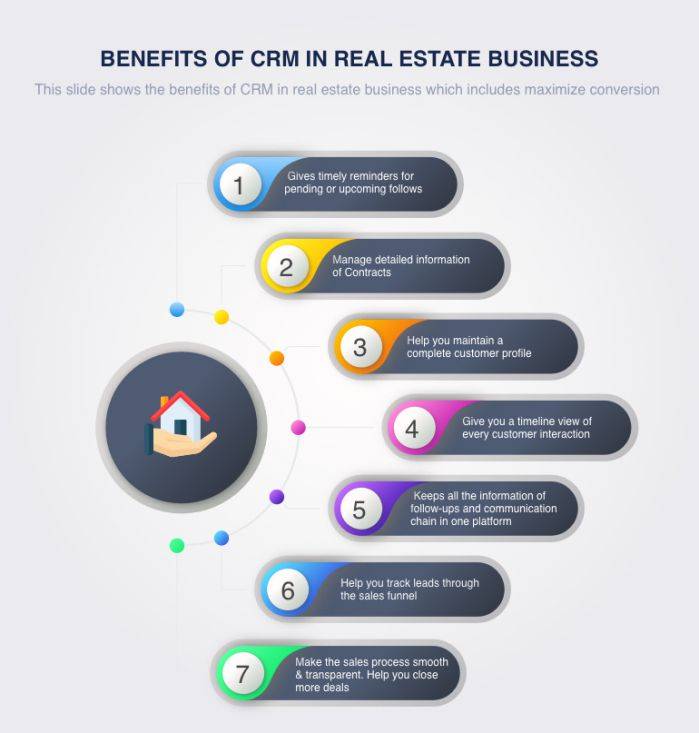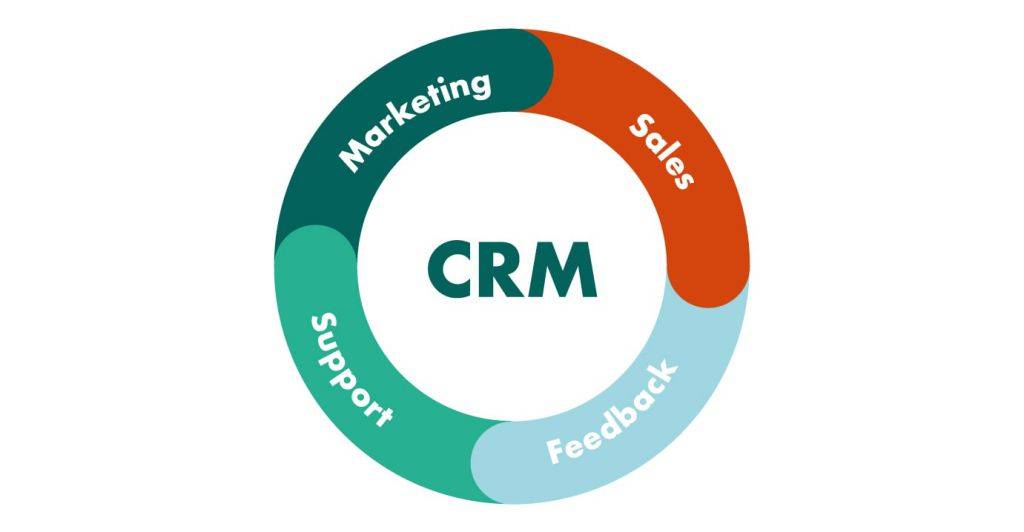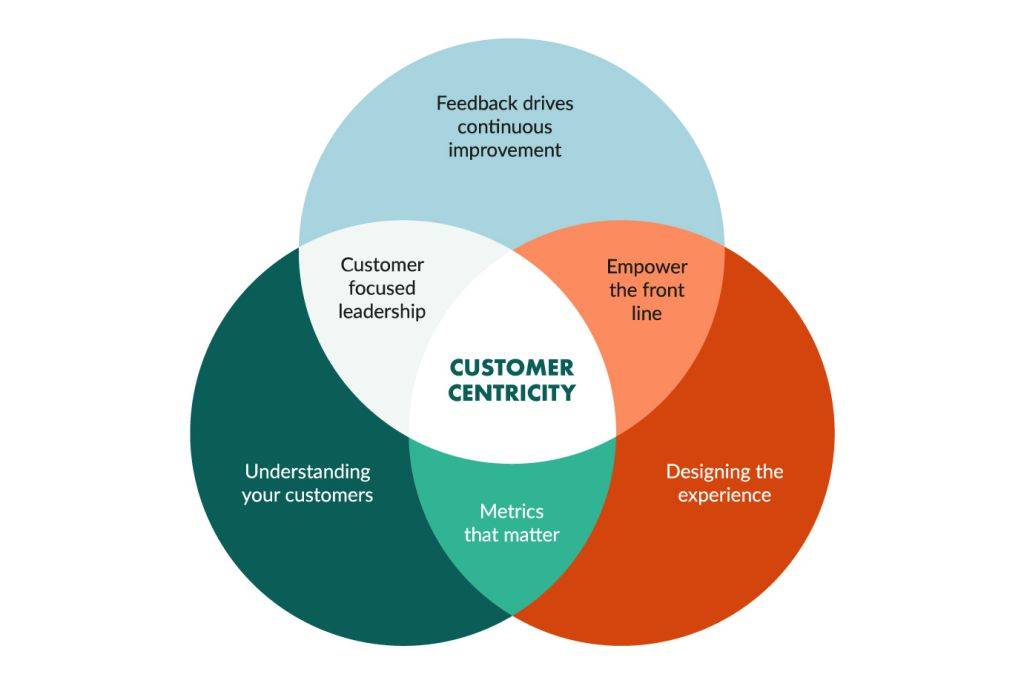The real estate industry is constantly evolving, and with it comes a wealth of data that can help agencies make informed decisions, optimize strategies, and drive better results. Enter the world of CRM, or customer relationship management software.
With the power of data, a CRM can provide accurate insights into customer behavior, buying patterns, and expectations, empowering real estate agencies to work smarter, not harder. In this blog post, we’ll explore the power of data in the real estate industry and how a CRM can be a game-changer for real estate agencies looking to stay ahead of the curve.

I. Introduction
Definition of CRM
Customer relationship management (CRM) is a system that helps businesses manage all their interactions and relationships with customers and potential customers. The goal is to improve business relationships to grow your business.
A CRM system makes it easy to stay connected with customers, streamline processes, and improve profitability. It allows companies to store customer information, identify sales opportunities, record service issues, and manage marketing campaigns all in one central location. With visibility and easy access to data, it is easier to collaborate and increase productivity.
Every department in your company can access customer information and use it to provide better customer support and service. CRM tools can be especially beneficial to small businesses where teams need to do more with less. [1][2]
Importance of Data in Real Estate
Data is vital to the real estate industry, offering unparalleled insights into customer behavior, buying patterns, and preferences. With it, real estate agents and agencies can make informed decisions, manage and track leads, communicate effectively with clients, improve efficiency and productivity levels, receive valuable insights and analytics, and much more.
Access to comprehensive data enables real estate professionals to optimize operational efficiency and resource allocation, leading to increased customer satisfaction and reduced operational costs.
Additionally, data-driven decision-making processes can help improve customer experiences, and by employing predictive analysis techniques, agents can gain an edge in the market and provide enhanced services to their clients. In short, without data, modern real estate agencies and professionals would find themselves at a significant disadvantage. [3][4]
II. How a Real Estate CRM Empowers Agents and Agencies
Managing and Tracking Leads
Managing and tracking leads is crucial for any real estate agency to ensure that every potential client is caught up. With the help of a CRM, realtors can easily manage all their leads in one place, eliminating the need to juggle multiple platforms.
This centralized lead management system allows for easy tracking of leads and enables agents to quickly assess which leads are hot and require immediate attention. Additionally, with the automated follow-up feature, agents can consistently engage with leads, increasing the chances of conversion.
The result? Improved efficiency, productivity, and revenue. In short, a CRM can empower real estate agents to make informed decisions and drive business growth by effectively managing and tracking leads. [5][6]
Effective Communication with Clients
Effective communication is crucial for real estate agents to establish trust and build long-lasting relationships with clients. Using a CRM system allows agents access client data such as communication history, preferences, and needs.
This information allows agents to tailor their communication approach and provide personalized service to each client. With the ability to send automated follow-up emails, agents can ensure timely and consistent communication without adding extra workload.
Additionally, agents can use the data to identify opportunities for upselling or cross-selling services to clients based on their needs. Effective communication increases customer satisfaction and helps real estate agents stand out in a competitive market. [7][8]

Improved Efficiency and Productivity
One major benefit of using a CRM system in the real estate industry is the significant improvement in efficiency and productivity. By streamlining data management, communication, and lead tracking, real estate professionals are able to spend less time on administrative tasks and more time focus on high-value activities such as closing deals and building relationships with clients.
In addition, CRM software provides real-time access to comprehensive lead and client information, ensuring that agents have the right information at their fingertips to make informed decisions and take appropriate action. By utilizing the latest technology and tools available, real estate agents can work more efficiently, make better use of their time and resources, and ultimately achieve greater success in their business [9][10]

Valuable Insights and Analytics
Valuable insights and analytics are essential for effective real estate industry decision-making. Through data analysis and predictive modeling, real estate professionals can gain insights into customer behavior, sales trends, and various key performance metrics that can guide critical business decisions.
Predictive analysis can predict market movements, assess risk factors, and provide valuable insights into property valuations. With the help of analytics tools such as Tableau, Google Analytics, and Looker, businesses can gain deeper insights into their data and make informed business decisions.
Platforms like MicroStrategy Analytics and Via Analytics also provide advanced analytics capabilities such as data mining, predictive modeling, visualization, and data management. With valuable insights and analytics, businesses can streamline their communication, increase efficiency, and improve customer satisfaction, thus driving growth and success [11][12]
III. Features of a Top Real Estate CRM
Comprehensive Lead Management
Comprehensive lead management is the key to success in the real estate industry. With the right CRM, real estate agencies can effortlessly track and manage leads, allowing them to prioritize high-quality prospects and ensure timely and personalized follow-ups.
Automation workflows reduce the burden of repetitive tasks on sales teams, freeing up more time to build relationships with potential clients and close deals. Effective customer engagement is vital for any real estate business, and the right CRM allows businesses to tailor communication and offerings to create personalized experiences.
By integrating property management systems into the CRM process, businesses can optimize their property management processes and make data-driven decisions to drive revenue growth and enhance customer experiences. [13][14]

Automated Communication and Follow-ups
Automated communication and follow-ups are game-changers for real estate agents. With multiple clients to handle, manually following up with each one can be overwhelming and time-consuming.
With the help of a CRM, agents can set up automated emails and notifications that keep their clients engaged and well-informed. These automated messages can include new property listing updates, upcoming appointment reminders, and personalized birthday greetings.
Such automation enhances communication and helps build long-lasting, trusted relationships with clients. Furthermore, automated communication and follow-ups give agents the ability to stay in touch with clients at all hours, from any location. It’s a great way to improve response times and, ultimately, to close more deals. [15][16]
Seamless Integration with Existing Systems
One of the key benefits of using a CRM for real estate is the seamless integration with existing systems. This real-time exchange of data ensures that both systems stay in sync, providing businesses with valuable information and empowering them to make informed decisions.
A real estate CRM is an all-in-one platform that enables real estate professionals to manage, attract, and nurture client relationships with existing and potential customers. Whether you specialize in residential or commercial real estate, a CRM can help you sell faster and better.
By integrating it with your existing systems, you can streamline your processes, reduce duplication of efforts, and save valuable time. With a real estate CRM, you can focus on what really matters – building valuable relationships with your clients, closing deals, and growing your business. [17][18]

IV. Benefits of Using a Real Estate CRM
Increased Efficiency
Utilizing a CRM system can significantly increase efficiency and productivity in real estate agencies. Agents can access information quickly and easily by centralizing data management and streamlining communication channels, minimizing mistakes and saving time.
Automating lead capture and tracking also ensures that no opportunity is overlooked, leading to increased lead conversion rates and better use of resources. This helps agents forge strong client relationships and provide personalized, prompt assistance. The data-driven insights offered by CRM software also allow for informed business decisions, improving overall strategic planning and decision-making processes.
With various software solutions on the market offering customizable and flexible options, real estate agencies can optimize their management and sales services to stay ahead of the competition. [19][20]

Streamlined Communication
Streamlined communication is one of the most important features of a CRM system for real estate agencies. Communication can quickly become overwhelming with so many clients, agents, and team members involved in a single transaction. A CRM system enables everyone to have access to the same information, reducing the chances of miscommunication or conflicting messages.
Additionally, automated communication and follow-ups ensure that clients are kept up-to-date on the status of their transactions without requiring agents to reach out to every client manually. By streamlining communication, agents can spend less time on administrative tasks and more time on activities that generate revenue, such as prospecting and closing deals.
Improved Customer Satisfaction
In the fiercely competitive world of real estate, keeping clients satisfied is crucial. A CRM system can help you put customer satisfaction at the heart of everything you do. By centralizing customer data and streamlining communications, a CRM enables you to respond quickly and efficiently to clients’ needs.
With automated workflows, you can ensure you get all important tasks or appointments, and by keeping track of every interaction you have with a client, you can provide more personalized service in the future.
By improving communication and providing valuable data-driven insights, a CRM can help you anticipate customer needs and tailor your approach to meet them. All of this results in a better customer experience, which leads to higher satisfaction rates and improved brand loyalty. [23][24]
V. Choosing the Right Real Estate CRM
Ease of Use
Real estate agents are always looking for ways to make their work as smooth and effortless as possible, and that is precisely what a CRM system offers. A good CRM system should be easy to use and intuitive. Real estate agents can save time on complicated software that takes ages to learn. Instead, a CRM system should allow agents to be up and running in no time, with minimal training.
An easy-to-use platform will help agents focus on what matters–building client relationships and closing deals. The last thing anyone wants is to waste time fumbling with a confusing system. An intuitive system means agents can get back to doing what they do best – selling real estate. [25][26]
Scalability
Scalability is an important consideration for real estate agencies when choosing a CRM. As businesses grow and expand, their needs change, and they require more advanced systems that can adapt to their evolving business requirements.
A scalable CRM can accommodate the needs of a growing real estate agency and can expand its functionalities as needed. This means that a CRM that works for a small agency can be easily upgraded as the agency grows without needing to switch to new software or systems.
Scalability also ensures the system can handle large amounts of data, increasing efficiency and reducing errors. Implementing a CRM with scalability features creates a sustainable solution that can grow with the agency and support its success for years to come. [27][28]
Key Takeaways for Real Estate Agents and Agencies.
In conclusion, real estate agencies and agents can benefit greatly from implementing a CRM system into their operations. By using a CRM, they can manage and track leads effectively, communicate with clients seamlessly, gain valuable insights and analytics, and improve efficiency and productivity.
Additionally, the ease of use and scalability of CRM software allows for the system to adapt and grow with the agency or agent. Ultimately, the use of a CRM system can lead to increased efficiency, streamlined communication, and improved customer satisfaction. Investing in a CRM can provide a competitive advantage and contribute to long-term success in the real estate industry. [29][30]




